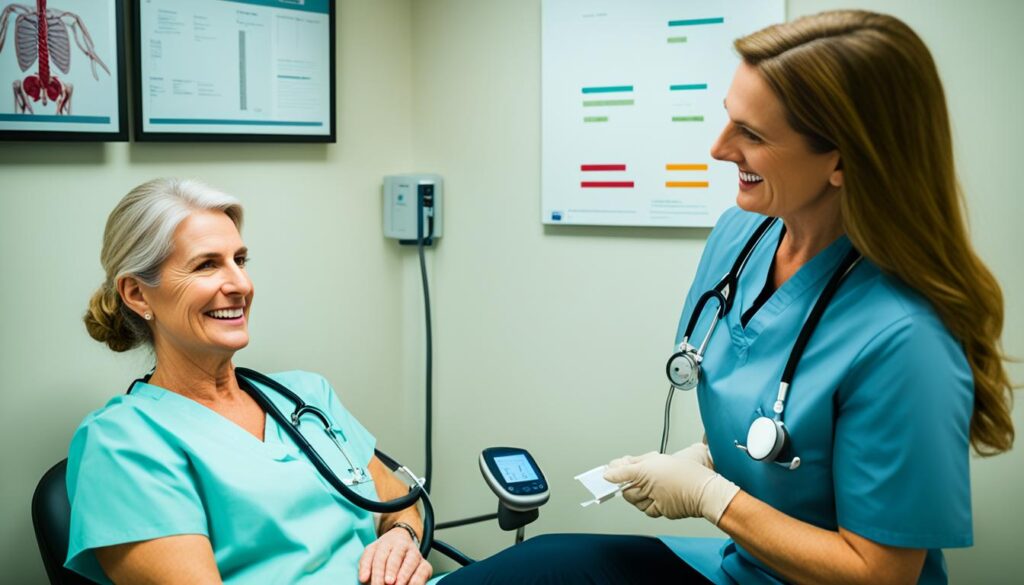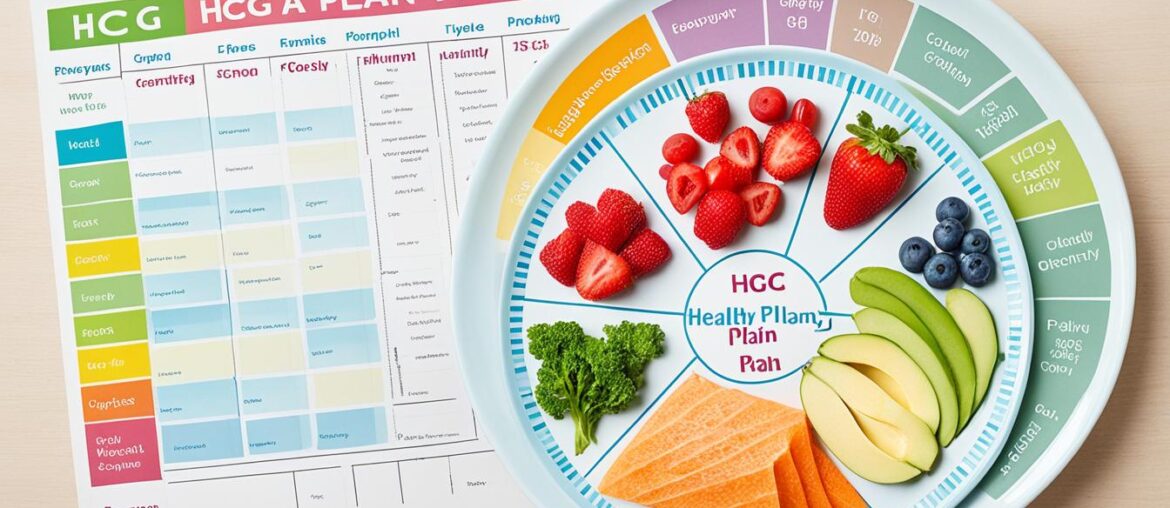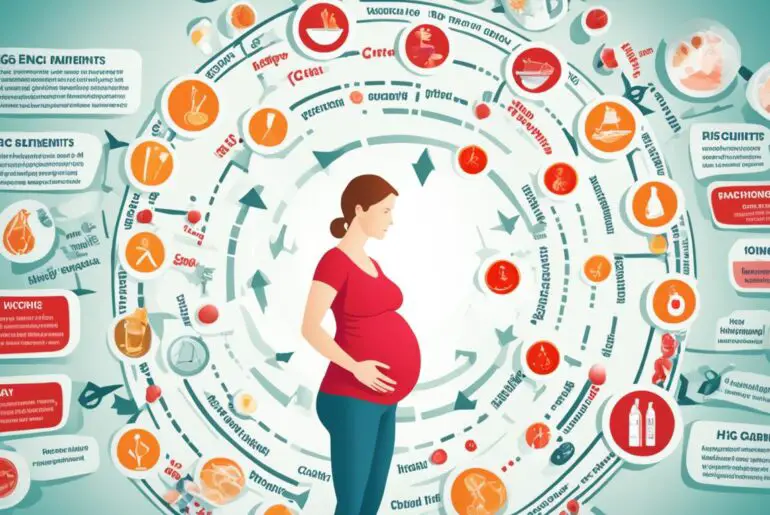Did you know that the HCG diet, a controversial weight loss plan, involves consuming only 500 calories per day? This extreme diet has gained popularity, promising rapid weight loss and increased fertility. However, it is important to understand the potential risks and limitations of the HCG diet before considering it for pre-pregnancy weight loss and preparation.
The HCG diet, also known as the hormone diet, relies on daily injections or intake of the human chorionic gonadotropin (HCG) hormone. While HCG is approved for treating fertility issues in women, it is not approved by the FDA for weight loss. In fact, the FDA has issued warnings about the safety and efficacy of HCG products for weight loss purposes.
If you are planning to get pregnant or are trying to conceive, it is not advisable to lose weight during pregnancy. The HCG diet should be avoided, as it involves extremely low-calorie intake that may not provide enough nutrients to support both your body and a developing baby.
Key Takeaways:
- The HCG diet involves consuming only 500 calories per day and using the HCG hormone.
- HCG is approved for treating fertility issues but not approved by the FDA for weight loss.
- It is not advisable to lose weight during pregnancy or if you are trying to conceive.
- The HCG diet may not provide enough nutrients for both your body and a developing baby.
- Safe and effective alternatives exist for pre-pregnancy weight loss and preparation.
The Role of HCG Hormone in Fertility
The HCG hormone plays a crucial role in fertility by stimulating the production of eggs from the ovaries, thereby increasing the chances of getting pregnant. This hormone, also known as human chorionic gonadotropin, is naturally produced by the placenta during pregnancy. However, it can also be used therapeutically to aid fertility in women who are struggling to conceive.
When undergoing HCG therapy, women typically receive injections or take supplements of this hormone to enhance their fertility. HCG therapy works by stimulating the ovaries to release mature eggs, which can then be fertilized by sperm and potentially result in pregnancy.
It is important to note that while the use of HCG hormone therapy has shown positive results in improving fertility, it is crucial to consult with a healthcare professional or fertility specialist to determine the appropriate dosage and treatment plan for your specific situation.
Quote: “The HCG hormone plays a vital role in fertility by stimulating egg production and increasing the likelihood of pregnancy.” – Dr. Jane Thompson, Fertility Specialist
However, it is essential to distinguish between HCG hormone therapy for fertility and the HCG diet for weight loss. The HCG diet, which involves severe calorie restriction and HCG hormone intake, is not intended for fertility enhancement and should be avoided if you are trying to become pregnant.
Understanding the Role of HCG Hormone in Fertility
During a normal menstrual cycle, the HCG hormone is naturally secreted by the placenta after conception occurs. This hormone supports the development of the uterine lining and helps maintain a healthy pregnancy. Its presence in the body is an indicator of pregnancy, and it is often detected through urine or blood tests.
When used therapeutically for fertility, HCG hormone injections or supplements mimic the natural hormone’s effects. The administered HCG stimulates the ovaries to produce multiple mature eggs, increasing the chances of successful fertilization and pregnancy.
The Importance of HCG Therapy for Fertility
For couples struggling with infertility, HCG therapy is often recommended as part of their treatment plan. It can be used in conjunction with other fertility treatments, such as in vitro fertilization (IVF) or intrauterine insemination (IUI), to optimize the chances of successful conception.
By stimulating the ovaries to produce more eggs, HCG therapy can address fertility issues caused by ovulation problems or hormonal imbalances. It is typically administered under the guidance and supervision of a fertility specialist to ensure the appropriate dosage and timing for optimal results.
HCG Diet Before Pregnancy

If you are considering trying the HCG diet, it is safest to do so before you start trying to become pregnant. The HCG diet involves consuming very few calories, which may not provide enough nutrients to support both your body and a developing baby. It is important to prioritize a healthy diet and maintain a sufficient calorie intake if you are planning to get pregnant in the near future.
Starting the HCG diet before pregnancy allows you to focus on weight loss and prepare your body for the changes that come with pregnancy. However, it is crucial to approach weight loss in a safe and sustainable way to avoid any negative impact on your fertility or overall health.
During pregnancy, it is not advisable to follow the HCG diet or any other restrictive diet plan. Your body requires additional calories and nutrients to support the growth and development of your baby. It is best to consult with a healthcare professional who can guide you on a suitable diet plan for pregnancy.
Remember, the safety of the HCG diet before pregnancy is a concern due to the low calorie intake and potential nutrient deficiencies that may arise. Prioritizing a well-balanced diet and healthy lifestyle is essential for optimal pre-pregnancy preparation.
Benefits of a Healthy Diet Plan for Pre-Pregnancy
Following a healthy diet plan before getting pregnant can provide numerous benefits. It can help you reach a healthy weight, which can improve fertility and reduce the risk of complications during pregnancy. A balanced diet rich in nutrients can also support hormonal balance and overall reproductive health.
When you prioritize a healthy diet, you provide your body with the necessary nutrients it needs for optimal reproductive function. Nutrient deficiencies can negatively impact fertility and may interfere with the normal hormonal processes in your body. By consuming a variety of nutritious foods, such as fruits, vegetables, whole grains, lean proteins, and healthy fats, you can support the proper functioning of your reproductive system.
Additionally, maintaining a healthy weight is essential for improving fertility. Excess weight can disrupt hormonal balance and increase the risk of conditions such as polycystic ovary syndrome (PCOS) and insulin resistance, which can interfere with ovulation and conception. Conversely, being underweight can also negatively impact fertility. By achieving a healthy weight through a balanced diet, you can enhance your chances of getting pregnant.
Consulting with a healthcare provider or a registered dietitian can help you create a personalized diet plan that meets your specific needs. They can assess your current nutritional status, provide guidance on proper portion sizes, and recommend specific foods that are beneficial for pre-pregnancy preparation. They can also address any concerns or conditions that may require dietary modifications.
Adopting a healthy diet plan before trying to conceive can contribute to a successful and healthy pregnancy. Remember, it’s not only about what you eat during pregnancy, but also the groundwork you lay with a nutritious diet beforehand.
A healthy diet plan for pre-pregnancy not only supports fertility but also lays the foundation for a healthy pregnancy. It is important to ensure that you are consuming a variety of nutrients, including essential vitamins, minerals, and antioxidants, to support reproductive health and prepare your body for the demands of pregnancy.
Weight Loss Plan for Pre-Pregnancy

When it comes to preparing for pregnancy, achieving a healthy weight can have significant benefits for fertility and overall health. However, it’s crucial to follow a safe and gradual weight loss plan that prioritizes adequate nutrition and energy. Crash diets and extreme calorie restriction, such as the controversial HCG diet, should be avoided before pregnancy.
The key is to work with a healthcare professional who can design a weight loss plan tailored to your individual needs and goals. They will consider factors such as your current weight, health status, and any underlying medical conditions. Together, you can create a plan that ensures safe and sustainable weight loss.
A safe weight loss plan before pregnancy typically involves making gradual dietary changes and incorporating regular physical activity. It may also involve portion control, balanced meal planning, and monitoring calorie intake. The focus should be on creating a calorie deficit that supports weight loss without compromising nutritional needs.
It’s worth noting that losing weight too rapidly or through extreme measures can negatively impact fertility. By adopting a balanced approach, you can enhance your chances of conception while supporting your overall well-being.
Remember, the ultimate goal is to prepare your body for a healthy pregnancy. Working with a healthcare professional ensures that your weight loss plan aligns with your unique needs and supports your fertility journey.
Safe Weight Loss Strategies for Pre-Pregnancy:
- Consult with a healthcare professional or registered dietitian to create a personalized weight loss plan.
- Focus on gradual weight loss, aiming for a safe and sustainable rate of 1-2 pounds per week.
- Incorporate balanced meals that provide essential nutrients for fertility and overall health.
- Engage in regular physical activity that you enjoy, such as walking, swimming, or yoga.
- Monitor portion sizes and practice mindful eating to avoid overeating.
- Stay well-hydrated by drinking plenty of water throughout the day.
- Get sufficient sleep and manage stress levels to support overall well-being.
By following these safe weight loss strategies and working closely with a healthcare professional, you can achieve a healthy weight before pregnancy, increasing your chances of a successful conception and a smooth pregnancy journey.
Comparing Safe Weight Loss Methods
| Weight Loss Method | Benefits | Considerations |
|---|---|---|
| Safe and gradual weight loss through a well-balanced diet and regular exercise |
|
|
| Crash diets or extreme calorie restriction |
|
|
| HCG diet |
|
|
Medical Weight Loss Diet for Pre-Pregnancy
If you need to lose weight before pregnancy, it is advisable to seek medical guidance and supervision. A healthcare professional can recommend a tailored weight loss plan that takes into account your specific health needs and goals. This may involve a combination of diet, exercise, and potentially medication or other interventions. A medical weight loss plan can ensure that you are losing weight safely and in a way that supports your overall health and fertility.
Why Choose a Medical Weight Loss Plan?
A medical weight loss plan for pre-pregnancy offers several advantages over other weight loss methods. Firstly, it provides personalized guidance and supervision by healthcare professionals who specialize in weight management and women’s health. They can assess your current health status, consider any underlying medical conditions, and design a plan that suits your individual needs.
Furthermore, a medical weight loss plan ensures that you are losing weight in a safe and healthy manner. Crash diets or extreme calorie restrictions, such as the HCG diet, can lead to nutrient deficiencies and potentially harm your overall health and fertility. By following a medically supervised plan, you can achieve gradual weight loss while maintaining the necessary nutrient intake for optimal well-being.
The Benefits of a Medical Weight Loss Plan
Embarking on a medical weight loss plan before pregnancy offers a range of benefits. Firstly, it can improve your chances of conceiving by addressing any underlying factors that may be affecting your fertility. Losing excess weight can regulate hormone levels, improve menstrual regularity, and enhance the quality of your eggs.
In addition to fertility benefits, a medical weight loss plan can also reduce the risk of complications during pregnancy. By achieving a healthy weight before conception, you can lower the chances of gestational diabetes, hypertension, and problems with labor and delivery. Furthermore, losing weight can improve your overall health, boost your energy levels, and enhance your mental well-being, ensuring a positive pre-pregnancy experience.
Getting Started with a Medical Weight Loss Plan
If you are considering a medical weight loss plan, start by scheduling an appointment with a healthcare professional who specializes in weight management or women’s health. During the initial consultation, they will assess your health, discuss your goals, and create a personalized plan tailored to your needs. This may include diet modifications, exercise recommendations, and regular check-ins to monitor your progress.
Remember, it is important to be patient and realistic with your weight loss goals. Gradual and sustainable weight loss is key to long-term success and ensuring a healthy pre-pregnancy journey. With the support and guidance of a medical weight loss team, you can embark on a safe and effective plan that prioritizes your health, fertility, and overall well-being.
The Safety Concerns of the HCG Diet

The HCG diet has raised significant safety concerns and remains a source of controversy in the medical community. The U.S. Food and Drug Administration (FDA) has not approved HCG for weight loss purposes and has issued warnings about the safety and efficacy of HCG products in this context.
One of the main risks associated with the HCG diet is the extreme calorie restriction it requires. With a daily intake limited to just 500 calories, this diet can lead to severe nutrient deficiencies, muscle loss, and metabolic slowdown.
Furthermore, over-the-counter HCG products that are commonly used for the diet are illegal and unregulated. This lack of oversight poses potential health risks, as the quality and purity of these products cannot be guaranteed. Users may unknowingly expose themselves to harmful substances or inadequate dosages of HCG.
It is crucial to prioritize safe and evidence-based methods when it comes to weight loss and pre-pregnancy preparation. Consulting with healthcare professionals, such as registered dietitians and physicians, can provide you with the guidance needed to embark on a safe and effective weight loss journey. They can help tailor a diet plan that suits your individual needs, supports your overall health, and minimizes any potential risks.
“Extreme calorie restriction and the use of unregulated HCG products can pose serious health risks and undermine the effectiveness of weight loss efforts.”
| Risks of the HCG Diet | Safety of the HCG Diet |
|---|---|
| Severe nutrient deficiencies | Not approved by the FDA for weight loss |
| Muscle loss | Over-the-counter HCG products are illegal and unregulated |
| Metabolic slowdown | Potential exposure to harmful substances |
Alternatives to the HCG Diet for Pre-Pregnancy

When it comes to pre-pregnancy weight loss and preparation, there are plenty of safe and effective alternatives to the HCG diet. These alternatives focus on promoting a healthy lifestyle and gradual weight loss while supporting fertility and overall health. Consider incorporating the following strategies into your pre-pregnancy plan:
- Following a balanced and nutritious diet: Opt for a diet rich in fruits, vegetables, lean proteins, whole grains, and healthy fats. This approach ensures that you receive essential nutrients while managing your weight.
- Engaging in regular physical activity: Incorporate moderate exercise into your daily routine to boost metabolism, burn calories, and maintain muscle tone. Choose activities that you enjoy and that are safe for pre-pregnancy.
- Seeking guidance from healthcare professionals: Consulting with a healthcare provider or a registered dietitian can provide valuable insights and personalized recommendations for your pre-pregnancy journey.
- Considering medical weight loss programs: If you need additional support, explore medical weight loss programs that are supervised by healthcare professionals. These programs can provide tailored guidance and support to help you achieve your weight loss goals safely and effectively.
By prioritizing overall health, hormonal balance, and gradual weight loss, you can increase the chances of a healthy pregnancy and set a solid foundation for the journey ahead.
Expert Insight:
“Choosing a well-rounded and sustainable approach to pre-pregnancy weight loss is crucial for optimal fertility and overall health. Focus on nourishing your body with nutrient-dense foods, staying physically active, and seeking professional guidance when needed. These alternatives to the HCG diet will set you up for success on your pre-pregnancy journey.”
Pre-Pregnancy Care and Support

When preparing for pregnancy, it is crucial to prioritize pre-pregnancy care and seek support from healthcare professionals. The guidance and expertise of OB/GYNs and other healthcare providers can prove invaluable in this important phase of your life.
During pre-pregnancy consultations, healthcare professionals can provide comprehensive guidance on various aspects, including diet, weight management, fertility, and hormonal balance. These consultations allow you to address any concerns, ask questions, and receive personalized advice tailored to your specific needs and circumstances.
The regular check-ups and screenings conducted during pre-pregnancy care help ensure that you are on the right track for a healthy pregnancy. These appointments provide opportunities to monitor your reproductive health, identify any underlying issues, and take necessary steps to address them. By proactively managing your health, you can optimize your chances of a successful and healthy pregnancy.
Building a strong healthcare team to support you during the pre-pregnancy period is essential. Consistent collaboration with healthcare professionals ensures that you have access to the latest medical information and the guidance needed to make informed decisions about your pre-pregnancy health and wellness.
“Seeking pre-pregnancy care and support allows you to be proactive in optimizing your health and preparing for a successful pregnancy journey.”
The Benefits of Pre-Pregnancy Care and Support
Engaging in pre-pregnancy care and receiving support from healthcare professionals offers numerous advantages:
- Optimal health: By prioritizing pre-pregnancy care, you are taking steps to ensure that your body is in the best possible condition for conception and pregnancy.
- Early detection: Regular screenings and check-ups can identify any potential health issues at an early stage, enabling timely intervention and treatment if necessary.
- Fertility support: Healthcare professionals can offer strategies and advice to enhance fertility and increase your chances of conception.
- Guidance on healthy lifestyle choices: Pre-pregnancy care includes recommendations on diet, exercise, and lifestyle adjustments that promote optimal health and reproductive well-being.
- Support throughout the pre-pregnancy journey: Healthcare professionals act as a reliable source of information, offering ongoing guidance and support tailored to your unique circumstances.
By investing in pre-pregnancy care and support, you are investing in your own well-being and the health of your future child. The guidance and personalized care received during this phase lay a strong foundation for a positive and healthy pregnancy experience.
| Benefits of Pre-Pregnancy Care and Support |
|---|
| Optimal health |
| Early detection of health issues |
| Fertility support |
| Guidance on healthy lifestyle choices |
| Support throughout the pre-pregnancy journey |
Importance of Well Woman Checkups

Regular Well Woman checkups and Pap smears are crucial for maintaining women’s health and detecting any potential issues early on. These checkups provide a comprehensive assessment of your reproductive health and can help identify and address any fertility concerns. Additionally, they offer valuable information and support for pre-pregnancy weight management and overall well-being.
Scheduling regular Well Woman checkups with an experienced OB/GYN or healthcare provider is highly recommended to stay proactive in maintaining your reproductive health. During these checkups, your healthcare provider will perform a variety of tests and exams, including:
- Pap smears to screen for cervical cancer
- Breast exams to check for any abnormalities or signs of breast cancer
- Screenings for sexually transmitted infections
- Assessment of hormonal balance
- Discussion of contraception options
- Support and guidance for pre-pregnancy weight management
| Benefits of Well Woman Checkups |
|---|
| Early detection of potential health issues |
| Preventive care and screenings to maintain optimal reproductive health |
| Identification and support for fertility concerns |
| Educational resources and guidance for pre-pregnancy weight management |
| Assessment and monitoring of hormonal balance |
Regular Well Woman checkups play a critical role in ensuring your overall reproductive health and well-being. They provide an opportunity for early intervention, guidance, and support, enabling you to take proactive steps towards a healthy pregnancy and a fulfilling life.
“Prevention is better than cure.” – Desiderius Erasmus
Conclusion
When it comes to pre-pregnancy weight loss and preparation, it is essential to prioritize safe and evidence-based methods. The HCG diet plan for pre-pregnancy, while popular, is not recommended due to safety concerns and the lack of scientific evidence supporting its effectiveness. Instead, it is advisable to focus on adopting a healthy, balanced diet and engaging in regular physical activity to support weight loss for pre-pregnancy.
By following a safe diet plan for pre-pregnancy, you can ensure that your body receives all the necessary nutrients to maintain optimal health and function. Seeking guidance from healthcare professionals, such as registered dietitians or OB/GYNs, can provide personalized advice and support tailored to your specific needs and goals.
By prioritizing overall health and hormonal balance, and taking a gradual and sustainable approach to weight loss and pre-pregnancy preparation, you can enhance your fertility and increase the chances of a healthy pregnancy. Remember, it’s important to consult with your healthcare provider to determine the best weight loss plan for your unique circumstances. By making informed choices and prioritizing your well-being, you are laying the foundation for a healthy and successful pregnancy.
FAQ
Is the HCG diet recommended for pre-pregnancy weight loss?
No, the HCG diet is not recommended for pre-pregnancy weight loss. It involves extreme calorie restriction, which may not provide enough nutrients to support both your body and a developing baby.
Can the HCG diet affect fertility?
While the HCG hormone plays a role in fertility and is used in HCG therapy for women having difficulty getting pregnant, it is not recommended to start the HCG diet if you are trying to become pregnant. High levels of HCG hormones could have negative effects on the pregnancy.
What are the benefits of a healthy diet plan before pregnancy?
Following a healthy diet plan before becoming pregnant can help you reach a healthy weight, improve fertility, reduce the risk of complications, support hormonal balance, and overall reproductive health.
What is a safe weight loss plan for pre-pregnancy?
It is important to follow a safe and gradual weight loss plan that provides adequate nutrition and energy. Crash diets or extreme calorie restriction, such as the HCG diet, are not recommended. Consulting with a healthcare professional can help you create a weight loss plan that is appropriate for your individual needs and goals.
Is there a medical weight loss diet for pre-pregnancy?
Yes, a healthcare professional can recommend a tailored weight loss plan that takes into account your specific health needs and goals. This may involve a combination of diet, exercise, and potentially medication or other interventions to ensure safe and effective weight loss.
Are there safe alternatives to the HCG diet for pre-pregnancy?
Yes, there are many safe and effective alternatives to the HCG diet for pre-pregnancy weight loss and preparation. These may include following a balanced and nutritious diet, engaging in regular physical activity, seeking guidance from healthcare professionals, and considering medical weight loss programs that are supervised and tailored to individual needs.
Why is the HCG diet considered unsafe?
The HCG diet is considered unsafe due to safety concerns and the lack of evidence supporting its effectiveness. Extreme calorie restriction can lead to nutrient deficiencies, muscle loss, and metabolic slowdown. Over-the-counter HCG products are illegal and unregulated, posing potential health risks.
What is important to consider in pre-pregnancy care and support?
It is important to seek pre-pregnancy care and support from healthcare professionals. Regular check-ups, screenings, and consultations can help ensure that you are on the right track for a healthy pregnancy. Building a strong healthcare team to support you during the pre-pregnancy period can provide valuable information and support.
Why are well woman checkups important?
Well woman checkups, including Pap smears, are important for maintaining women’s health and detecting any potential issues early on. Regular checkups can help identify and address any fertility concerns, as well as provide information and support for pre-pregnancy weight management and overall health.




